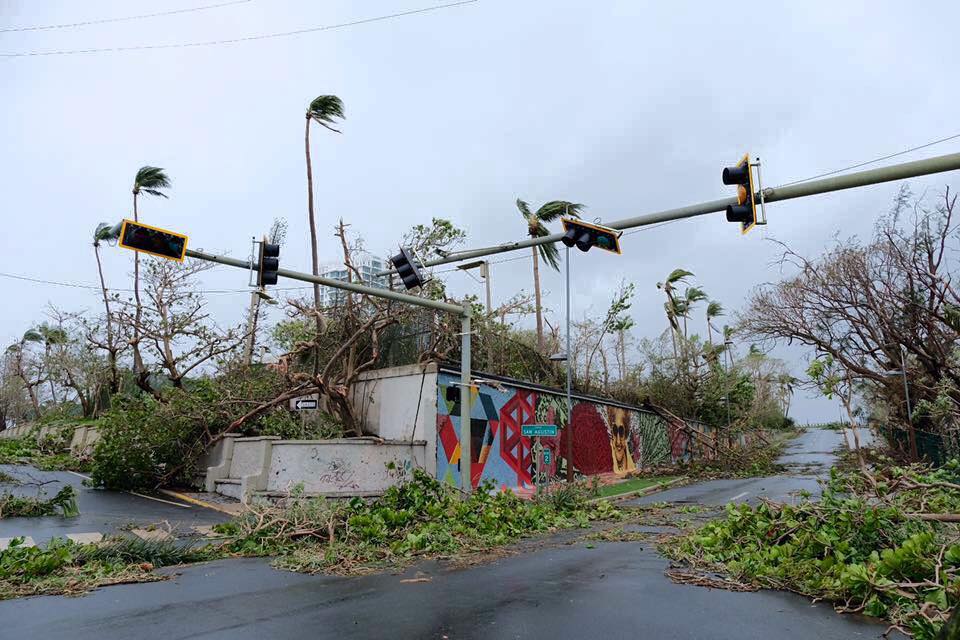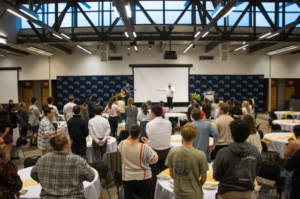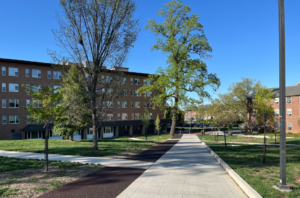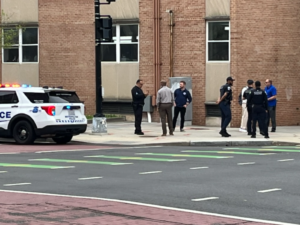Catholic Puerto Rican Student Goes Home to Make Documentary After Hurricane Maria

One of the many scenes of destruction that Puerto Rican student Adriana Oliver came home to see. Courtesy of Adriana Oliver

By Luis Rivera
Adriana Isabelle Oliver, a senior Drama major from Puerto Rico, filmed a documentary on the aftermath of the disastrous Hurricane Maria and its impact on the Caribbean island. The film, 65 Days After Maria, involves other Puerto Rican students at Catholic and shows the destruction she found when she returned home over Thanksgiving break in November.
“It was as if an atomic bomb exploded on the island,” Oliver said.
February 20th marked five months since the disastrous Hurricane Maria wreaked havoc on the United States Commonwealth of Puerto Rico. Oliver, who first arrived to the mainland U.S. for her freshman year of college in 2014, decided to produce a documentary about the events of the storm and its aftermath. She is now in her last semester at CUA and has watched from afar as the island where she grew up endured the dangerous wrath of Mother Nature.
She recalled her experience during the hurricane’s landfall as one of anxiety and stress.
“Hours before the hurricane had come, I was already stuck on my laptop watching the news, and for 48 hours I didn’t go to classes, I was just stuck there,” Oliver said.
Oliver was taking Media 312, a documentary filmmaking course in the Media Studies department, and knew what her documentary for the class was going to be about. Sixty-five days after the hurricane made landfall, Oliver returned to Puerto Rico. While back on the island, she documented the destruction around her neighborhood in San Juan. Then she got into a car and drove. Scenes from her documentary captured images of downed trees, wires, and damaged homes.
With over 155 mph winds, the category four hurricane knocked out power to the entire island.
“These people did not experience a hurricane,” Oliver says in her documentary 65 Days After Maria, which she has since submitted to the DC Film Festival. “They experienced a tornado with water.”
Oliver’s grandmother, who lives in a two story house, lost her entire first floor. “She lost everything—everything.” Her grandmother had to come to Virginia to live with family until she was able to move back to Puerto Rico recently, with her first floor still uninhabitable.
Oliver’s grandmother wasn’t alone. According to the Center for Puerto Rican Studies at Hunter College in New York City, it was estimated in October 2017 that between 114,000 and 213,000 Puerto Ricans would flee the island and relocate to the U.S. mainland within a year. Currently, there are 4.9 million Puerto Ricans living on the mainland U.S., which is more than the 3.7 million that still live on the island.
Puerto Rico, a U.S. territory located in the Caribbean, came under U.S. possession after the American victory in the Spanish-American War in 1898. Puerto Ricans were later granted American citizenship on March 2, 1917 when the Jones Act was signed into law by President Woodrow Wilson—about a month before the U.S. would enter into World War I.
Although Puerto Ricans are U.S. citizens, they lack the right to vote in presidential elections. They are not required to pay federal income taxes, but they must still pay Social Security, Medicare, commodity, export and import taxes while receiving far less governmental aid for programs such as Food Stamps, Medicaid, and Social Security than American citizens in the 50 states. Furthermore, they have only one non-voting representative in the House of Representatives, and Puerto Ricans have been drafted by the United States military. This has left many Puerto Ricans feeling as if they were second-class citizens.
With no direct voting power in Congress, Oliver is convinced that it will take years for a full recovery, and Puerto Rico’s debt will be a primary source of that delay. According to CNN Money, Puerto Rico’s debt stands at roughly $73 billion. Five months later, the government-run Puerto Rico Electric Power Authority (PREPA) reported that 75 percent of its consumers have power, leaving over 400,000 customers still without power. PREPA too is in the hole, over $9 billion in debt.
If Oliver were to meet President Trump or other lawmakers, she would have one request. “It’s a really big request…Perhaps, forgive the debt, or at least half of it because realistically we can’t pay that debt.”
She also makes clear that the U.S. has definitely helped the island, especially the U.S. troops. However, she did find President Trump’s tossing of paper towels at Puerto Ricans as “disrespectful….There’s so much more that we need, it’s not just paper towels.” In addition to its power grid, Puerto Rico needs to rebuild its water and sewer system, where over 70 percent of tap water is contaminated with coliform bacteria and chemicals from untreated waste when the power shuts off, as it did again last Sunday, February 11th.
CUA has done its part by waiving tuition to Puerto Rican students affected by the hurricane to allow them to study at the university for a semester. According to the Undergraduate Admissions Office, seven students have enrolled as non-degree students for the semester in order to continue their schooling uninterrupted by the hurricane.
Just recently, Congress added disaster relief into the two-year budget deal to keep the government running. According to the New York Times, $2 billion was allocated to repair Puerto Rico’s power grid and $9 billion will be allocated to projects across Puerto Rico and the U.S. Virgin Islands, which were also affected by the hurricane. Whether the allocation is enough to contribute to a successful recovery, when Puerto Rico sought over $94.4 billion in total disaster aid in November, remains to be seen.
Yet, the people who weathered the storm are resilient. Oliver travelled home again during Christmas break, and noticed an encouraging revival. She recounts seeing many businesses in San Juan reopened, while also acknowledging that the outer regions still need help.
While the road to recovery is still being traversed, Oliver explains that she will return to the island after graduation in May.
“I still have my sister’s high school graduation to attend,” she said.
Link to the documentary 65 Days After Maria – https://filmfreeway.com/65days








